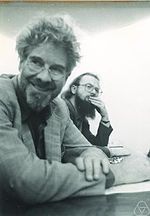E. C. Zeeman
| Christopher Zeeman | |
|---|---|

Erik Christopher Zeeman in 1980, courtesy MFO
|
|
| Born | Erik Christopher Zeeman 4 February 1925 Japan |
| Died | 13 February 2016 (aged 91) |
| Residence | United Kingdom |
| Citizenship | British |
| Fields | Mathematics |
| Institutions |
University of Cambridge University of Warwick University of Oxford Gresham College |
| Alma mater | Christ's College, Cambridge |
| Doctoral advisor | Shaun Wylie |
| Doctoral students |
Peter Buneman David Epstein Ray Lickorish Tim Poston Colin Rourke David Trotman Terry Wall |
| Known for |
Catastrophe theory Geometric topology Singularity theory |
| Notable awards |
Senior Whitehead Prize (1982) Faraday Medal (1988) David Crighton Medal (2006) |
| Notes | |
Sir Erik Christopher Zeeman FRS (4 February 1925 – 13 February 2016), was a British mathematician, known for his work in geometric topology and singularity theory.
Zeeman's main contributions to mathematics were in topology, particularly in knot theory, the piecewise linear category, and dynamical systems.
His 1955 thesis at the University of Cambridge described a new theory termed "dihomology", an algebraic structure associated to a topological space, containing both homology and cohomology, introducing what is now known as the Zeeman spectral sequence. This was studied by Clint McCrory in his 1972 Brandeis thesis following a suggestion of Dennis Sullivan that one make "a general study of the Zeeman spectral sequence to see how singularities in a space perturb Poincaré duality". This in turn led to the discovery of intersection homology by Robert MacPherson and Mark Goresky at Brown University where McCrory was appointed in 1974.
Zeeman is known among the wider scientific public for his contribution to, and spreading awareness of catastrophe theory, which was due initially to another topologist, René Thom, and for his Christmas lectures about mathematics on television in 1978. He was especially active encouraging the application of mathematics, and catastrophe theory in particular, to biology and behavioural sciences.
...
Wikipedia
